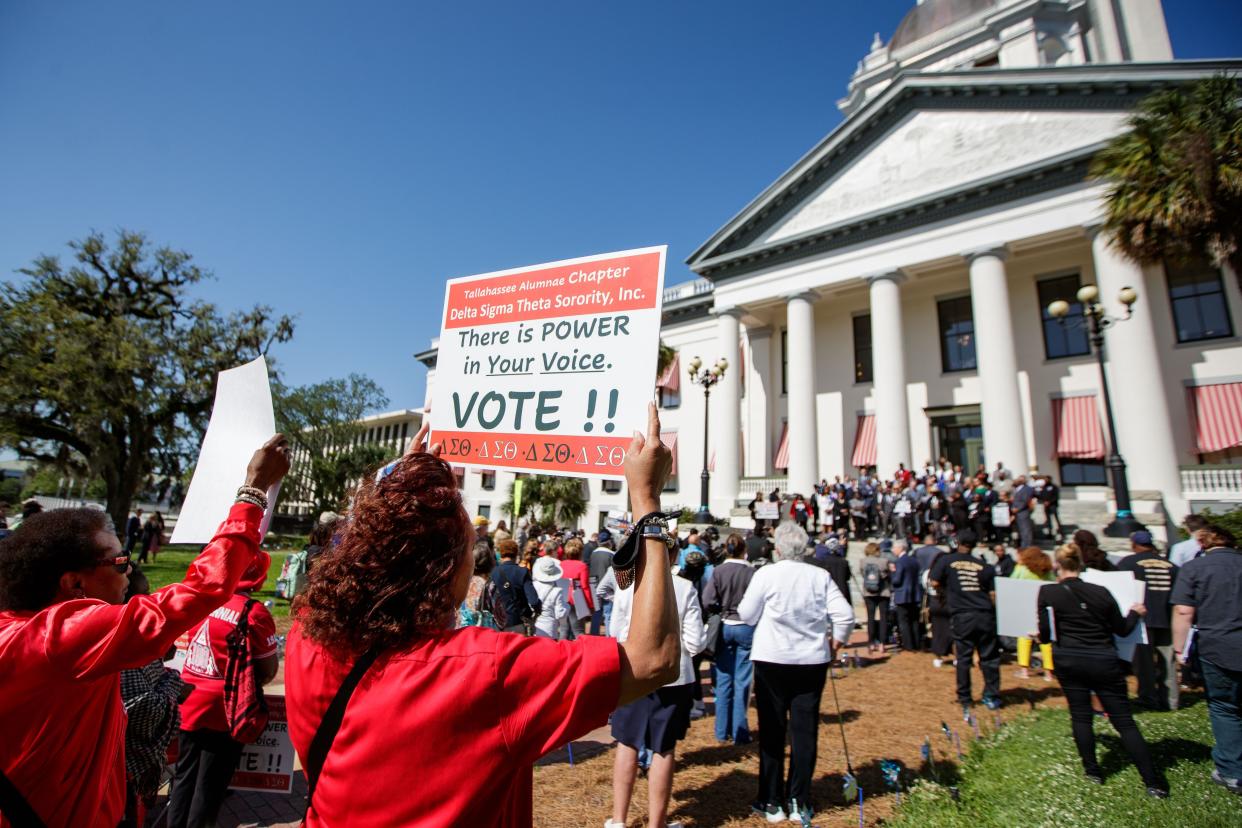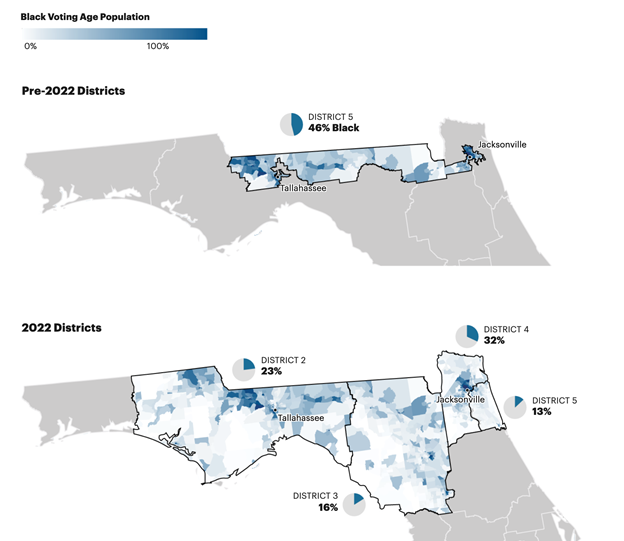DeSantis faces discrimination charge with congressional map, but proving it may be tough

- Oops!Something went wrong.Please try again later.
- Oops!Something went wrong.Please try again later.
TALLAHASSEE — With his “war on woke,” elimination of diversity programs and crackdown on how history is taught, Gov. Ron DeSantis has antagonized Black voters in Florida and the nation, with a poll earlier this year showing two-thirds oppose his presidential candidacy.
But in a Tallahassee federal courtroom this week, the Republican governor will be accused of “intentional racial discrimination,” for eliminating a North Florida seat held by Black Democratic U.S. Rep. Al Lawson.
New district boundaries pushed by DeSantis scatter thousands of Black voters across four districts won by GOP members of Congress.
“To achieve that goal, he hijacked the redistricting process in an unprecedented manner, thumbing his nose at the Florida Supreme Court, the Florida Legislature and the Florida Constitution,” according to plaintiffs, including the NAACP, Common Cause and Fair Districts Florida, in briefs filed with the U.S. District Court.

On Tuesday, a three-judge panel – two appointed by Republican presidents and one by a Democrat – will begin a trial over the validity of the state’s GOP-leaning congressional map.
DeSantis ridiculed the old Lawson district as racially gerrymandered and demanded – and got – from the GOP-controlled Legislature what he called a race-neutral map.
Republicans captured 20 of Florida’s 28 districts, a four-seat gain last fall that helped the party gain command of the U.S. House. DeSantis has taken credit for the GOP’s success while campaigning for the party’s presidential nomination, in which he is trailing far behind former President Donald Trump.
State judge already ruled map unconstitutional
Florida’s congressional map has already been ruled unconstitutional by Leon County Circuit Judge J. Lee Marsh, who rejected the state’s contention that maintaining a Tallahassee to Jacksonville district held since 2016 by Lawson would violate the U.S. Constitution’s equal protection clause, basically by hurting white voters.
Marsh’s ruling is now before the 1st District Court of Appeal. The DCA surprisingly took control of the case despite agreements from both the state and plaintiffs, which include Black Voters Matter and the Florida League of Women Voters, that any appeal should go straight to the Florida Supreme Court.
Amid growing concerns about a potential delay in deciding the state case, this week’s federal trial possibly could lead to a swifter outcome on whether state lawmakers must redraw the congressional map and restore Lawson’s old Tallahassee to Jacksonville district before next year’s elections.
Plaintiffs fear the 1st DCA, whose judges were appointed by Republican governors, and the Florida Supreme Court, where five of the seven members were picked by DeSantis, could take their time deciding the case.
Delays and appeals could leave map in place for '24
Even if the map is ruled invalid, timing could leave it in place through the 2024 elections, when Republicans’ narrow control of the U.S. House is again at stake. Florida’s four-seat GOP gain last year was the party’s biggest improvement in the nation.
Plaintiffs, though, face challenges in federal court.
“To say this isn’t just about politics, but race, well, proving racial animus is difficult to do,” said Michael McDonald, a University of Florida political scientist and redistricting expert.
“It’s just a very high hurdle to cross, so it will likely be very difficult for the plaintiffs to get a favorable ruling. Not to say that they can’t. It’s just a very high bar.”
In filings with the court, the voters groups suing the state argue that not only did DeSantis’ demand elimination of the Tallahassee to Jacksonville district, but he also rejected legislative proposals that would have retained a Black-leaning district, confined to Jacksonville.
“Gov. DeSantis was viscerally opposed to any district in North Florida in which Black voters could elect a representative of their choice – no matter how such a district was configured,” according to a pre-trial brief from the voters’ organizations.
The trial is expected to last close to a week, according to attorneys for the two sides.
DeSantis sticks with 'race-neutral' argument
Attorneys for DeSantis and the state say the court should disregard accusations by the voters’ groups.
“Because the Enacted Map doesn’t have this kind of race-based gerrymander in North Florida, plaintiffs claim that the Enacted Map is the product of intentional discrimination and thus violates the Fourteenth Amendment’s Equal Protection Clause and the Fifteenth Amendment” which guarantees voting rights, the state argues.
The two constitutional amendments were added in the wake of the Civil War.
“Plaintiffs can’t flip the Civil War Amendments on their head; the amendments were enacted to prevent state-based racial discrimination, not mandate it,” state lawyers argue in their pre-trial brief.
DeSantis defends map on two fronts DeSantis-led redistricting under legal fire after boosting GOP, erasing Black district
DeSantis changed map, and history Special session: Florida lawmakers heeding Gov. DeSantis' demand for new congressional map, enraging opponents
It’s likely that attorneys for the voters’ groups will extract testimony from witnesses that will remind the three-judge panel of DeSantis’ often controversial record on race.
DeSantis has enacted measures limiting discussion of race in schools and workplaces, has said slavery provided valuable job skills and installed an elections crimes and security unit which arrested 19 voters – most of whom were Black – during last year’s election season.
The NAACP earlier this year accused DeSantis of creating a culture of “open hostility towards African Americans and people of color.”
A Washington Post-Ipsos poll from May showed 67% of Black voters said they would not consider supporting DeSantis. It also showed general dissatisfaction among Black voters for the entire Republican presidential field.
U.S. Supreme Court rulings this summer may have bolstered the claims of voters’ groups suing over Florida’s congressional map.
In a hearing before Judge Marsh, plaintiffs’ attorneys argued that DeSantis had merely copied his “race-neutral” view of redistricting from an Alabama case before the U.S. Supreme Court.
Justices, though, in a 5-4 decision in June, ruled that Alabama’s Republican-dominated state legislature had denied Black voters a reasonable chance to elect a second U.S. representative of their choice.
But the Alabama map is still being fought over in court, along with congressional redistricting cases from Georgia and Louisiana where maps were found by lower courts to be gerrymandered to reduce Black representation.
With Florida also in play, voters' groups are concerned Republican leaders could be relying on a legal strategy involving delays and appeals designed to keep invalidated maps in place through the 2024 elections.
Their attorneys urged that the three-judge panel use “exigency” in reaching a decision.
“Any new maps for the 2024 elections must be finalized by Spring 2024, before the end of the next legislative session,” the plaintiffs said in their pre-trial brief.
John Kennedy is a reporter in the USA TODAY Network’s Florida Capital Bureau. He can be reached at jkennedy2@gannett.com, or on Twitter at @JKennedyReport
This article originally appeared on Tallahassee Democrat: Federal court weighs DeSantis congressional redistricting plan

